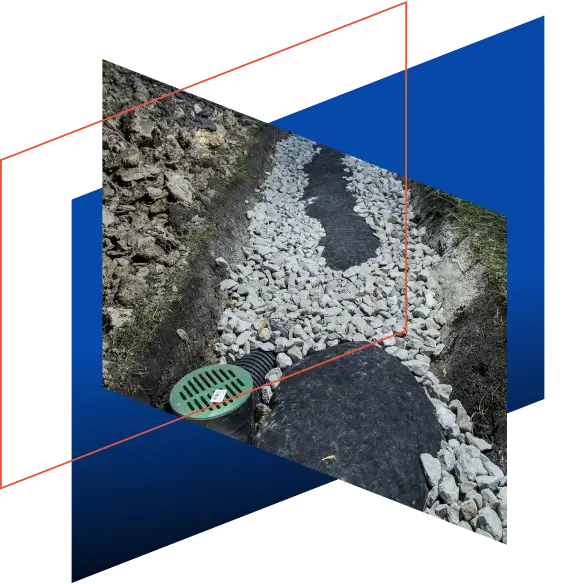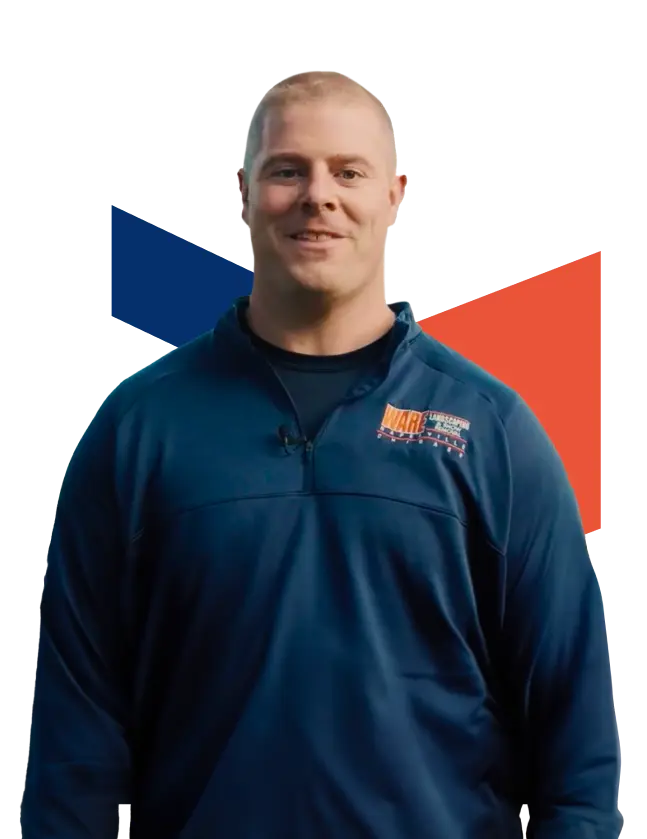Top 3 Rated Top 3 Landscaping Companies
10 Year Drainage Guarantee
10K+ Happy Customers Served
5 Star Average (222 Google Reviews)
222 5 Star Reviews

If your yard doesn’t drain naturally away from your home, you may notice standing pools in the yard after a storm. The build-up of water looks harmless enough, but it can cause several issues, including damaging your home’s foundation.
The experienced team at Ware Landscaping helps homeowners and businesses in Naperville and throughout Chicagoland with drainage. Our guiding mission is not just to help take the burden of lawn care off of your hands, but to help make an impact on your life and your family’s life.
“Last year, we called Mike and his crew and as you can see it is completely dry and the grass is beautiful he did the landscaping as well, and it is amazing”

Stagnant water in your yard can be a prime environment for mosquitoes to breed, which can cause an annoying and potentially dangerous problem. Mosquitoes are known to spread viruses and other diseases.
If you’re seeing any of the following in your yard, it may be a sign of a drainage issue: soggy soil, pooling water, foundation cracks, floods, basement mold, and damage to plants.
For the best results, it’s best to consult with a professional yard drainage expert. Ware Landscaping has the necessary tools, crew, and expertise to properly assess underlying issues, create a tailored solution, re-grade the lawn, install the system, and monitor its effectiveness. DIY solutions may also provide proper lawn drainage, but an expert will ensure your lawn is both attractive and healthy.
A swampy lawn can be drained by excavating the affected areas and adding drainage tiles or French drains to redirect water away from the area. Alternatively, adding sand or topsoil can help absorb excess moisture, while aeration and overseeding with grass seed can promote a healthier lawn.
Poor yard drainage is typically caused by factors such as inadequate grading, clogged gutters and downspouts, hard surfaces that do not allow for water absorption, and a failing septic system. All of these issues can prevent proper drainage from the area, resulting in puddles and standing water.
Professional landscapers or contractors typically install drainage systems around houses. It is often best to hire a professional with the necessary experience and technical skills to ensure drainage is installed properly. At Ware Landscaping, we are proud to have 175 positive reviews, and we have been honored to serve the Chicago suburbs for over a decade.
Drainage problems in your basement can be hard to solve without professional help. Attempting to do it yourself may not be sufficient, as you may lack the skills and experience necessary to accurately identify all of the sources of the problem, find an ideal solution that is cost-effective, and correctly install a large drainage system.
At Ware Landscaping, we offer a free initial consultation so that you can understand the issue thoroughly before committing to our services.
Installing drainage around your home is essential for landscaping for a variety of reasons. It can protect plants and soil from damage caused by excess moisture, prevent flooding, reduce the number of pests in your yard, improve the look of your property, and protect your home’s foundation.
Regrading your yard may be necessary if the lawn is waterlogged. A drainage expert can assess the situation and determine if this is the best solution. If so, they will adjust the slope of your property to allow excess water to flow away from your house and out to an appropriate drain or remote area.
The experts at Ware can help you with water flow problems, even if a drainage system has already been installed. There may be issues due to broken pipes, changes in the environment or region, or installation mistakes.
A professional drainage expert will assess the situation to determine if repair or replacement is needed to resolve the problem and ensure your lawn stays dry.
Most likely, yes. A French drain may be an effective solution for standing water in a basement. A professional drainage expert should assess the situation and determine if this type of drain is the best option, as some other solutions may be more suitable based on the specific circumstances.
The water table is the upper level of an underground surface, where soil and rocks are saturated by water. Landscapers and property owners must be aware of their area’s water table level; high levels may require a drainage system to be installed.
Water table levels can fluctuate due to environmental or human development, so regular upkeep from drainage solutions experts is recommended for long term results.
Summer or fall is the best time of year to install a drainage system. Chicagoland is known for harsh winters, so taking proactive steps to prevent damage to your home’s foundation from a build-up of water due to excessive rain and the additional winter snowmelt makes sense.
Installing a French drain is an effective and affordable solution that takes care of drainage issues quickly, efficiently, and cost-effectively. Once installed, the problem will be permanently eliminated so you won’t have to worry about it ever again. Our team can determine if this is the best lawn drainage solution for you.

We offer a 10 year, no questions asked yard drainage guarantee. This means we promise that you will never have to worry about sitting water in your home again. If you encounter this issue again in the future, we will fix it free of charge.
The duration of yard drainage improvements varies based on the complexity of the problem and the necessary solution. Installing a French drain can take several days, while simpler fixes like gutters and downspouts may only require a few hours to complete.
We do not employ a risky one-size-fits-all approach when it comes to the health and quality of your landscape. Our specialized drainage solutions team offers a free initial assessment to analyze the causes of your drainage problem and determine the best possible solution. Additionally, we tailor each of our drainage installation and repair projects to your property’s specific needs.
We serve Naperville and the surrounding cities and villages, including Lisle, Mount Prospect, Hinsdale, Oswego, Aurora, Glen Ellyn, Oak Brook, Palatine, St. Charles, Westmont, Barrington, Barrington Hills, Barrington Lake, Batavia, Burr Ridge, Clarendon Hills, Crystal Lake, Downers Grove, Geneva, Wheaton, and more.

Privacy Policy
Your privacy is important to us. This notice explains our online information practices and the choices you can make about the way your information is used at our site.
THE INFORMATION WE COLLECT
We do not collect personally identifiable information about you – such as your name, address, telephone number, fax number, e-mail address, etc. – unless you choose to fill out a “Contact Us” form, found on many of the pages of the site or to email us directly.
We do automatically collect certain non-personally identifiable information when you visit our site – such as the type of browser you are using, the type of operating system you are using, and the domain name of your Internet service provider (e.g., America Online, Earthlink).
HOW WE NORMALLY USE INFORMATION ABOUT YOU
We use non-personally identifiable information to analyze site usage (such as aggregated information on the pages visited by our users), which allows us to improve the design and content of our site.
In the ordinary course, we use personally identifiable information you provide solely to respond to your inquiry.
We will not contact you about other matters, unless you specifically request it, nor will we share, rent, or sell your personally identifiable information outside Ware Landscaping. If you are interested in applying for a job at Ware Landscaping, and choose to submit resume information by email, we will use it only for the internal application review process. We will not voluntarily share, rent or sell it outside Ware Landscaping.
However, it is possible, though unlikely, that we might be forced to disclose personally identifiable information in response to legal process or when we believe in good faith that the law requires it, for example, in response to a court order, subpoena or a law enforcement agency’s request.
Also, we cannot guarantee the privacy of personal information you transmit over the web or that may be collectable in transit by others, including contractors who provide services to us.
COLLECTION OF INFORMATION BY THIRD-PARTY SITES AND SPONSORS
Our site contains links to other sites whose information practices may be different than ours. Visitors should consult the other sites’ privacy notices as we have no control over information that is submitted to, or collected by, these third parties.
Ware Landscaping posts information about programs and events that are sponsored by or co-sponsored other firms or organizations. Should you choose to register electronically for any of these events, Ware Landscaping, will have no control over the third-party sponsors’ use of this information. As for our own use of your registration information, that will be handled by us as if you had registered by telephone or on paper. In other words, the privacy policies applicable to our Web site will not apply.
COOKIES
A cookie is a text-only string of information that a website transfers to the cookie file of the browser on your computer’s hard disk so that the website can remember who you are. A cookie will typically contain the name of the domain from which the cookie has come, the “lifetime” of the cookie, and a value, usually a randomly generated unique number.
When you visit our website we send you a cookie. Cookies may be used in the following ways:
Two types of cookies may be used on this website, session cookies, which are temporary cookies that remain in the cookie file of your browser until you leave the site, and persistent cookies, which remain in the cookie file of your browser for much longer (though how long will depend on the lifetime of the specific cookie).
DISABLING/ENABLING COOKIES
You have the ability to accept or decline cookies by modifying the settings in your browser. However, you may not be able to use all the interactive features of our site if cookies are disabled.
OUR COMMITMENT TO SECURITY
We employ security measures to prevent unauthorized access to information that we collect online. However, we cannot guarantee the security of your personal information.
HOW TO CONTACT US
If you have any questions or concerns about the privacy policy for Ware Landscaping, or its implementation, you may contact us at (312) 529-4633. If at any time you decide that we should no longer hold any of your personal data, or wish to change the use to which any such data can be put, please let us know by calling us at this number.
REVISIONS TO OUR PRIVACY POLICY
We reserve the right to revise this policy or any part of it from time to time. Please review the policy periodically for changes.
TERMS OF USE
Welcome to the Website of Ware Landscaping (”Ware Landscaping”). The Terms and Conditions for use of this site are written below. Please read them carefully. By using this site, you acknowledge that you both have read and accept these terms and conditions. If you do not agree with these terms and conditions, do not use this site.
We invite you to contact us and welcome your calls, letters and electronic mail.
NO WARRANTY
THIS SITE IS PROVIDED “AS IS.” WARE LANDSCAPING MAKES NO WARRANTIES OR REPRESENTATIONS OF ANY KIND ABOUT THIS SITE INCLUDING ITS SOFTWARE, CONTENT OR INFORMATION. WARE LANDSCAPING WILL HAVE NO LIABILITY FOR DAMAGES RESULTING FROM USE OF THIS SITE EVEN IF SUCH DAMAGES RESULT FROM ERRORS, NEGLIGENCE OR DELIBERATE ACTS OF WARE LANDSCAPING. WARE LANDSCAPING DOES NOT WARRANT THAT THIS SITE IS FREE FROM VIRUSES. AS IN ANY INTERNET TRANSACTION, WARE LANDSCAPING CANNOT CERTIFY THAT TRANSACTIONS ARE FREE FROM INTERCEPTION INTERFERENCE OR VIRUSES. WARE LANDSCAPING SHALL HAVE NO LIABILITY FOR ANY INFORMATION NOT RECEIVED BY YOU OR ANY UNAUTHORIZED ACCESS BY THIRD PARTIES. IF YOUR STATE DOES NOT PERMIT THIS WAIVER OF LIABILITY, WARE LANDSCAPING’S LIABILITY SHALL BE LIMITED TO THE AMOUNT YOU PAID TO ACCESS THIS SITE.
LINKED SITES
WARE LANDSCAPING HAS NO CONTROL OVER OR RESPONSIBILITY FOR MATERIAL ON OTHER WEB SITES ACCESSED BY HYPERTEXT LINKS FROM THIS SITE. HYPERTEXT LINKS ARE PROVIDED ONLY AS A CONVENIENCE TO USERS OF THIS SITE. WARE LANDSCAPING DOES NOT VERIFY THE INFORMATION ON LINKED SITES AND DOES NOT ENDORSE THESE SITES OR THEIR SOURCE.
DISCLAIMER
This Website has been prepared solely for the purpose of providing information about Ware Landscaping and the services and products it offers. This Website has been compiled in good faith by Ware Landscaping. However, no representation is made as to the completeness or accuracy of the information it contains. In particular, you should be aware that this information may be incomplete, may contain errors or may have become out of date.
Ware Landscaping reserves the right to add, modify or delete any information at this Website at any time. This publication and any references to products or services are provided “as is” without any warranty or implied term of any kind.